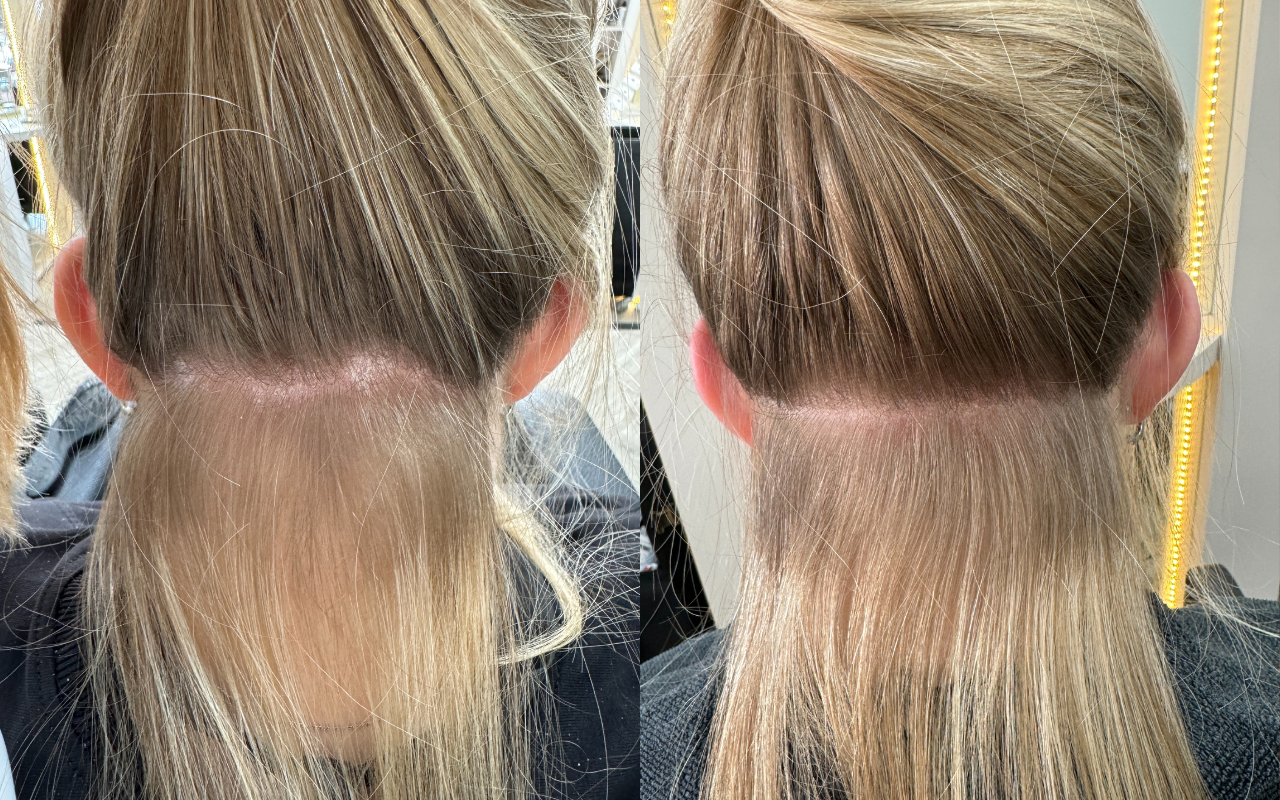The effects of stress on your hair and scalp.
Racing heart, sleepless nights, digestion troubles… these are the internal effects of stress. The inner effects of stress get a lot of attention but what about the visible effects that we can see on the outside as a result of stress including the appearance of our skin, scalp and hair?
Just think about it, I’m sure you can recall a time where you noticed more hair than normal on your brush at a time you were under pressure? Or that your scalp feels itchy and irritated during stressful times? You may or may not have made the connection but what is happening on top of your head reflects of what's happening inside it!
Stress symptom - Hair Loss (Telogen Effluvium)
Why and how does stress cause hair to start shedding or falling out? At certain times in life, you may experience times of great despair, whether it is losing a job, the death of a loved one, divorce, a traumatic surgery or pregnancy. These events can have a powerful effect on your body, potentially causing hair to fall out in clumps. Whilst the condition of temporary hair loss (Telogen Effluvium) is mostly noticed after traumatic events it can also be as a result of long term emotional stress such as chronic anxiety, having a a work-life balance out of whack or worrying over finances.
The temporary condition, called Telogen Effluvium, begins around the time of trauma and causes a large number of follicles to suddenly shift from their growing phase to their resting/shedding phase. ( Usually, only around 10% of the hair follicles are resting at any more time which is why the normal hair growth cycle means we lose around 50-100 hairs per day yet the average head has around 100,000 follicles. )
Increased shedding and thinning hair begin immediately after trauma yet you may not notice for up to 3 months. Telogen Effluvium can last from 2 to 6 months but also be longer if you are still experiencing prolonged stress or trauma and it can take up to 18 months for you hair follicles to fully recover. Deficiencies in nutrients such as vitamins D and B, iron, zinc, magnesium, protein and essential fatty acids can exacerbate the problem, so doing your best to eat well and take care of yourself during times of stress is key. This can all start with your hair.
What can you do?
The presence of another stressor can only make matters worse so do whatever you can to keep stress in check. Our Founder Laura Tudor experienced Telogen Effluvium first hand when she suffered from extreme hair loss after a particularly stressful time. The fortunate thing about the visible signs of stress such as hair loss is that they can give you an opportunity to make life changes so that you don’t continue to experience more severe health symptoms as a result. Instead of getting more stressed about losing hair, try to be accepting and patient in order to allow you body the time it needs to heal. Hair growth is a slow process, so be kind to yourself even if you are noticing clumps of hair falling, most people don’t develop a bald patch but rather thinner hair all over. Most people's hair does fully recover after 6 to 12 months but if you are worried you should always book to see a GP who can rule out any underlying health conditions that could also be the cause, and check for any nutritional deficiencies so you know what you are lacking in.
Our Tender Love & Hair vegan supplements are designed to specifically increase the blood nutrient supply whilst also helping to reduce stress with targeted combination of vitamins, minerals, herbs and amino acids including bamboo Silica for hair growth.
Stress Symptom - Dry, Itchy, Sensitive Scalp
Ever experienced yourself scratching away at your head when your stressed? What is going on here? Whether you have been struggling with the long term effects of lockdown life, or putting in extra hours in the office, in the city or even the hospital even, simply experiencing a few consecutive days of stress and pressure can ramp up certain hormones and inflammatory chemicals in the body. This chemical change can aggravate your immune system and compromise the scalp’s barrier function That means it is easier for moisture to escape, potentially leaving your hair and scalp drier, and open for irritants to get in and cause a dry, flaky and itchy scalp. Once this happens, even hair care products that may not have bothered you before may now cause an uncomfortable reaction.
What Can You Do?
At this time it is important to be gentle to the skin of your scalp and treat it with care. Try to wash your hair less and use gentle sulphate free cleansers such as our Daily Calma Shampoo or our Fragrance Free Altered State Solid Shampoo Bar with Aloe Vera. Our hero En-Root Scalp Treatment is also an amazing topical oil based itchy scalp treatment that can have a calming effect with Castor, Coconut, Tea Tree and Chamomile. As always, prevention is better than cure so try to also create work boundaries in order to avoid periods of stress and take steps to help manage stressors such as having a self care routine involving a morning routine, meditation and yoga and a heathy diet of whole foods.
The last word
Remember, the best way to address these symptoms is to manage your stress and what’s causing it otherwise you only mask the symptoms. While you may be able to cross a few to-dos off your list or put a work deadline behind you, it’s true that other stressors—like dealing with a loss—can linger. If your best efforts for stress management still leave you feeling burdened, you might also consider speaking with a therapist. Talking to someone about your stressors and reactions to them can help you devise additional strategies for getting to a better place. Developing a better relationship with your mental health and the tools to deal with what life throws your way can greatly improve your experience of life and general longevity and wellbeing whilst also reducing the commutative stress you experience on a daily basis.
If you have any questions don't hesitate to reach out, we are always here to help - hello@wearecentred.com



